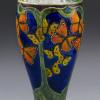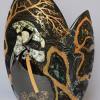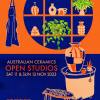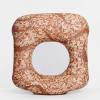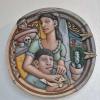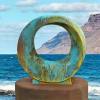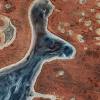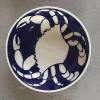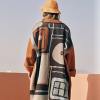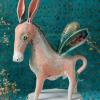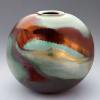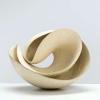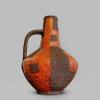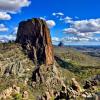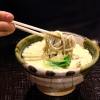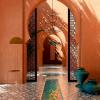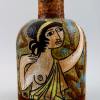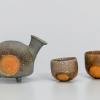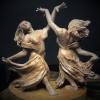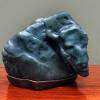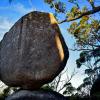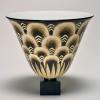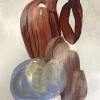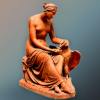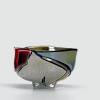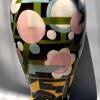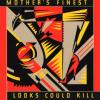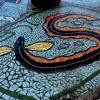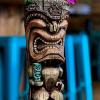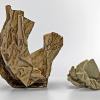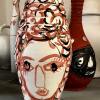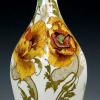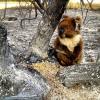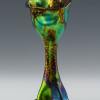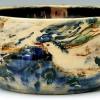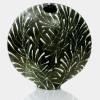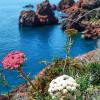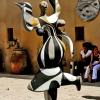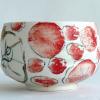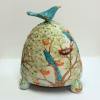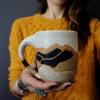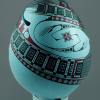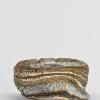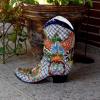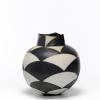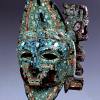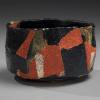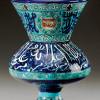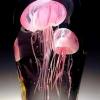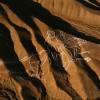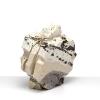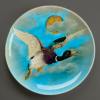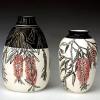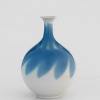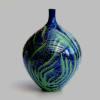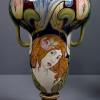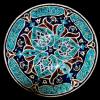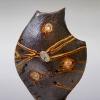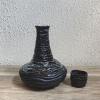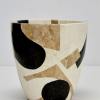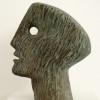
Adam Whatley
Adam Whatley is a ceramic artist based in Escondido California. Each of his pieces features different glazes, washes and clay additives and are fired between cone 6 – 10. His methods and techniques are documented on his flickr page at texasadam and I’ve included some here to highlight the diversity of his wares.
Adam Whatley’s Website
Shino Glaze
The shino glazes have properties that make them ideal for wood firing. They are very reactive and offer a plethora of textural and colour responses to the variation of temperature and atmospheric conditions present in a wood fired kiln. The reduction phase of every stoke cycle encourages carbon trapping in the soda rich glazes and the shino glazes thrive in long sustained temperature firing and the slow cooling cycle typical of wood firing. The appealing rich shino surface is the result of the sympathetic melding of a clay body and feldspathic during a long firing and slow cooling process. The natural colour responses to the ash glaze deposits are endless and traditionally soft and radiant colours of white, peach, gray, blue and red surfaces were created. Over the years a multitude of shino glaze recipes have been developed, most being a combination of various soda fluxes and clay.

Tsurara-(氷柱 ‘Icicle’ -1930) Kato Tokura
Shino was the first white glaze used in Japanese ceramics and was fired in Anagama kilns. The Japanese word for white is ‘shiro’ which is probably the origin of the descriptive term for the glaze, but it has also been attributed to the tea master Shino Soshin, who had a favorite white-glazed, ‘shoe-shaped’ bowl, imported from South Asia, which he used as a teabowl.
In Japan in the 1930s and 1940s, two Japanese potters, Toyozo Arakawa and Hajime Kato, developed the first modern Shino glazes by studying Monoyama Shino pots. The subtle appearance and beauty of the original shino ware glazes also acted as a stimulus for potters outside of Japan to recreate these glazes using different soils and firing techniques, which resulted in many fascinating variations. The natural colour responses to the ash glaze deposits are endless.
In the 70’s, Virginia Wirt developed a glaze formula that combined soda ash and spodumene to the base of feldspar and clays with the objective of emulating the Japanese Shino. This came to be known as ‘American Shino’ and spawned numerous variations. Although many different colorants and fluxes can be added, creating a wide range of effects, Shino glazes in America tend to be characterized by the use of soda ash and by a high ratio of alumina to silica.
Saggers were used in Japan to protect the glaze from ash deposits and flames and in some instances they weren’t employed to encourage the likelihood of interesting yohen ( accidents) which led to rich colours and surface texture. Additional materials such as straw, oyster shells and rice husks were placed near the clay pieces to also enhance colours and textures.
[divider type=”plain” width=”thirdwidth” align=”aligncenter”]

Adam Whatley

‘Cup Tinure’ by Adam Whatley
Powder blue grey to deep walnut brown exterior from oxide wash. Very textured surface from burned out organics. Inside is white with burnt orange and dark areas from clay body where glaze has been removed.

‘Rosslare’ rice bowl – Adam Whatley
Shino and glass combine with cobalt blue and iron oxide to make a great surface on this cup/bowl. The inside is a bright white glaze with spots of orange iron oxide showing through. Turquoise glass drips surrounded by a deep maroon border run down the outside. Made from clay pulled from Texas soil and fired to cone 10. Perfectly holds whatever you choose.

‘Arvagh’ Shino Bowl – Adam Whatley
Hand built shino glaze and dark green glass are combined for a shiny and beautiful exterior of stack clay strips. Orange iron oxide shows on edges. Inside the shino glaze combines with a clear glaze too create a blistered effect around the rim and a smooth white interior.

‘Ardmore’ Shino Cup by Adam Whatley
Shino and glass combined with cobalt and iron oxide to make a great surface on this larger size cup/small bowl. Made from clay pulled from Texas soil and fired to cone 10. Perfectly holds whatever you choose. Microwave and dishwasher safe.

‘Clon’ Shino Cup by Adam Whatley
Twice fired surface with a matt turquoise over a shino glaze and cobalt blue wash. The inside is a glossy white with small areas where the cobalt pushed through from the outer clay surface during firing. In the sun small reflective mica particles show up.

‘Furbo’ bowl – Adam Whatley
A tall curved semi bowl perched on top of a base with tiny vertical cuts that has been dipped in spodumene glaze. Lime green, grey, and a pale yellow all show up in the beautiful glaze. Where the glaze gets thin is a burnt orange stripes from iron oxide. The inside of the bowl is a solid clear glaze showing the bright white clay underneath. This is a great decorative item or you can use it to hold some small items like nuts or candy.with stoneware clay pulled from Texas soil and fired to cone 10.

‘Rerrin’ shino cup by Adam Whatley

Soda fired lamp – Adam Whatley

‘Ballon’ oribe bowl – Adam Whatley
Glass frit combines with a deep oribe green glaze to make a really interesting surface on this bowl. Inside is a clear coat over a two types of stoneware clay marbled together. Amazing purples, deep ruby red, powder blue and aqua green all show up and gather around the bottom of the bowl to form drops.

‘Coolmine 1’ – shino cup by Adam Whatley
Extremely textured shino surface with crawling glaze on exterior. Dark areas of iron oxide and manganese. Inside is a smooth surface with white wood ash shino and creamy opal glass frit.

‘Umami 2’ – Adam Whatley

Adam Whatley shino bowl

‘Cashel’ – Adam Whatley

‘Sunna’ shino bowl – Adam Whatley

‘Shino Cup Black’
Heavily textured shino surface with crawling glaze on exterior. Dark areas of iron oxide and manganese. Inside is a white wood ash shino with creamy opal glass frit and areas of raw clay with iron oxide spots.

Textured shino cup – Adam Whatley

‘Naas’ – Adam Whatley
Shino and glass combine to make a great surface on the inside and outside of this small tea cup. The exterior has a combination of iron oxide and cobalt to create a black stain that is then carved to create a very unique pattern. Inside the glaze runs down in a deep maroon to the bottom where it turns a clear turquoise. Made from clay pulled from Texas soil and fired to cone 10. Perfectly holds whatever you choose. Microwave and dishwasher safe.

‘Killala’ Oribe Cup – Adam Whatley
Glass combines with a deep oribe green glaze to make a really interesting surface on this cup / bowl. Inside is a coat of bright white porcelain over a stoneware clay body. Amazing purples, deep ruby red, powder blue and aqua green all show up in this glaze.

‘Aughrim’ with mushrooms

‘Ashbourne’ – shino bowl – Adam Whatley

‘Balboa Park’ – Adam Whatley

‘Nenagh’ Ikebana Vase by Adam Whatley
An Ikebana vase with an iron rich clay body with black gosu and a milky clear glaze running across the surface. A moss green speckle shows up in some areas from a iron oxide over / under glaze and deep blue areas around the mouth from cobalt.

Adam Whatley shino vessel

‘Quin’ – Adam Whatley

‘Ruan 2’ – Adam Whatley
Colors of dark tobacco and deep walnut show through the shino glaze that runs over a thick coating of iron oxide inside and out. This cup shows a lot of surface character from pitted clay created from burned out organic matter. Lots of inky oil spots and areas of gold and bronze on the lip.

Moher 1 ceramic vase – Adam Whatley

‘Keadue’ by Adam Whatley
Extra thick Iron rich clay with perlite added for texture and strength in the building process. The inside of this bowl has a layer of porcelain covered with a clear glaze. A bright shino glaze combined with green glass is applied to the outer edge of this bowl and runs on all sides with a vertical line pattern as a complement .

Adam Whatley

‘Omeath’ – Adam Whatley
A matte shino exterior with deep orange where closest to the open flame. Assembled from layers of clay, the seams are joined using a “gosu” mixture of cobalt and iron oxide. These horizontal gosu lines wash down the exterior and bleed into the shino glaze. The inside is a glossy clear glaze over brushed on porcelain clay with marbling of two different stoneware clays underneath.

‘Bangorn’ Shino Cup – Adam-Whatley
Dry white cracked shino glaze combined with turquoise glass on the lip make for a great surface on this smaller sized cup. Inside is a clear glaze showing the extremely textured surface from the burned out organic material. Bubbles in the glass and the glaze along with a lots of pitting and cracking .This cup has an exceptionally distressed surface and would make an great tea cup.

‘Pettigo’ Shino – Adam Whatley
This bowl has a raw exterior with each layer of stacked clay being joined with iron oxide and a shino glaze. The crisp, white, porcelain interior is covered with a shiny smooth clear glaze. and made from clay pulled from Texas soil and fired to cone 10.

‘Brittas’ Shino Cup – Adam Whatley
Exterior has a very textured shino surface with heavily crawling glaze. Dark areas of iron oxide and manganese. Inside is a white wood ash shino with creamy opal glass frit. Drips of exterior wash run under interior glaze.

‘Mendelssohn’ Shino Cup – Adam Whatley

‘Tuam’– Adam Whatley

‘Shino Bowl Tulrahan’ – Adam Whatley

Adam Whatley

Choyo (朝陽 ‘Rising Sun’ 1969) by Arakawa Toyozo

Kato Tokuro—Akane Shino Chawan-(茜志野茶碗 ‘Crimson Shino Tea Bowl’ 1985)
NEXT POST — London international ceramics exhibition


